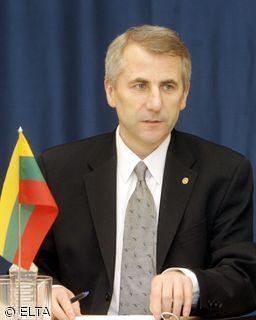Hungary will probably postpone euro adoption from 2008 to 2010 because of high inflation and budget deficits
Published:
26 February 2004 y., Thursday
Hungary will probably postpone euro adoption from 2008 to 2010 because of high inflation and budget deficits, Finance Minister Tibor Draskovics said. The National Bank of Hungary (MNB) has argued for faster adoption, saying it will boost growth.
Draskovics detailed some proposed cuts in state expenditure. Plans include reducing the number of higher civil servants, such as government advisors and state secretaries; the number of state-run foundations; and support for ethnic Hungarians abroad.
January inflation was higher than the Finance Ministry expected, at 6.6% yr/yr and 2.1% month-on-month. It expects annual inflation in 2004 to be near the higher end of its 6%–6.5% target band.
The February budget deficit is anticipated to be about Ft 180 billion (Ђ684 million), boosted by interest payments, Finance Ministry sources said. The estimated February gap would push the two-month figure to Ft 399 billion, or 43% of the full-year target.
Industrial output grew 6.4% in 2003, after a 2.8% increase in 2002, the Central Statistics Office (KSH) said. In December output fell 0.8% month-on-month.
Real wages rose by 9.2% in 2003, as the result of a 14.3% rise in average net wages and twelve-month consumer price inflation of 4.7%, the KSH announced.
The government wants to raise R&D spending to 1.8%–1.9% of GDP by 2006, and to 3% by 2010, Prime Minister Pйter Medgyessy said. Last year the figure was barely above 1%.
The number of operating businesses in Hungary rose 2.6%, to a total of 969,559 in 2003, including not-for-profit and budget-funded businesses, the KSH said.
Šaltinis:
bbj.hu
Copying, publishing, announcing any information from the News.lt portal without written permission of News.lt editorial office is prohibited.
The most popular articles
 When you fill up your car with petrol you often find that your hand will reek of petrol unless you have worn gloves.
more »
When you fill up your car with petrol you often find that your hand will reek of petrol unless you have worn gloves.
more »
 The EU is going through its worst recession since WWII. Inflation has slowed, but employment and public finances are hard hit. The situation should stabilise in 2010.
more »
The EU is going through its worst recession since WWII. Inflation has slowed, but employment and public finances are hard hit. The situation should stabilise in 2010.
more »
 In the current economic environment, banks should carefully analyze the current and future total cost of ownership of their technology assets, and evaluate the outsourcing alternative.
more »
In the current economic environment, banks should carefully analyze the current and future total cost of ownership of their technology assets, and evaluate the outsourcing alternative.
more »
 Commission proposes first EU law on hedge funds and issues guidelines on bank pay practices.
more »
Commission proposes first EU law on hedge funds and issues guidelines on bank pay practices.
more »
 On 30 April, Lithuania’s Minister of Foreign Affairs Vygaudas Ušackas took part in the round table discussion “The European Union’s External Trade Policy and Lithuania’s Positions: Threats and Possibilities for the Lithuanian Industry”.
more »
On 30 April, Lithuania’s Minister of Foreign Affairs Vygaudas Ušackas took part in the round table discussion “The European Union’s External Trade Policy and Lithuania’s Positions: Threats and Possibilities for the Lithuanian Industry”.
more »
 Since 28 April this year, the clients of AB Bank SNORAS will be able to process their financial matters in a clearer and more user-friendly environment of “Internet Bank+” system.
more »
Since 28 April this year, the clients of AB Bank SNORAS will be able to process their financial matters in a clearer and more user-friendly environment of “Internet Bank+” system.
more »
 2009 ageing report: Europe tackling the challenge of an ageing population but the recession threatens a setback.
more »
2009 ageing report: Europe tackling the challenge of an ageing population but the recession threatens a setback.
more »
 More choice, investment and security of supply lie at the heart of the 3rd energy package.
more »
More choice, investment and security of supply lie at the heart of the 3rd energy package.
more »
 Swine flu, a new strain of influenza, has so far left more than a hundred dead. But in one sector, the illness could have huge benefits.
more »
Swine flu, a new strain of influenza, has so far left more than a hundred dead. But in one sector, the illness could have huge benefits.
more »
 Central European bargain hunters are crossing borders for the best buys. Slovakian shoppers in Hungary are making the most of their new eurozone membership.
more »
Central European bargain hunters are crossing borders for the best buys. Slovakian shoppers in Hungary are making the most of their new eurozone membership.
more »